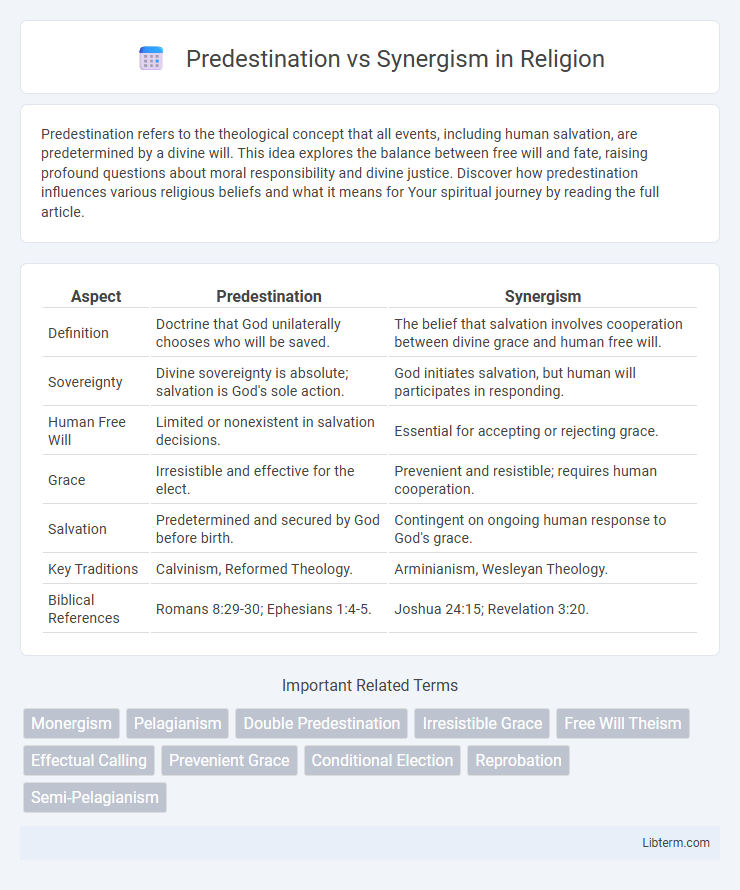Predestination refers to the theological concept that all events, including human salvation, are predetermined by a divine will. This idea explores the balance between free will and fate, raising profound questions about moral responsibility and divine justice. Discover how predestination influences various religious beliefs and what it means for Your spiritual journey by reading the full article.
Table of Comparison
| Aspect | Predestination | Synergism |
|---|---|---|
| Definition | Doctrine that God unilaterally chooses who will be saved. | The belief that salvation involves cooperation between divine grace and human free will. |
| Sovereignty | Divine sovereignty is absolute; salvation is God's sole action. | God initiates salvation, but human will participates in responding. |
| Human Free Will | Limited or nonexistent in salvation decisions. | Essential for accepting or rejecting grace. |
| Grace | Irresistible and effective for the elect. | Prevenient and resistible; requires human cooperation. |
| Salvation | Predetermined and secured by God before birth. | Contingent on ongoing human response to God's grace. |
| Key Traditions | Calvinism, Reformed Theology. | Arminianism, Wesleyan Theology. |
| Biblical References | Romans 8:29-30; Ephesians 1:4-5. | Joshua 24:15; Revelation 3:20. |
Understanding Predestination: Defining the Concept
Predestination refers to the theological doctrine that God has eternally chosen those who will attain salvation, emphasizing divine sovereignty and foreknowledge. This concept is rooted in Scripture passages such as Romans 8:29-30 and Ephesians 1:4-5, which highlight God's predetermined plan for believers. Understanding predestination involves recognizing it as God's unchangeable decree, independent of human effort or merit.
Synergism Explained: Human Cooperation in Salvation
Synergism in Christian theology emphasizes human cooperation with divine grace in the process of salvation, asserting that individuals actively participate in accepting God's gift of grace through faith and repentance. Unlike Predestination, which posits God's sovereign choice in electing individuals for salvation, Synergism holds that salvation requires a collaborative effort between God's initiative and human response. This view underscores free will's role, highlighting that while God's grace is essential, human assent and perseverance are necessary components in the redemptive process.
Historical Roots: Predestination in Christian Tradition
Predestination in Christian tradition traces its roots to early theological interpretations of scriptures such as Romans 8:29-30 and Ephesians 1:4-5, emphasizing God's sovereign choice in the salvation of individuals. Influential theologians like Augustine of Hippo advanced the doctrine, linking predestination with divine grace and original sin to explain human salvation. The doctrine was further developed during the Reformation by John Calvin, who articulated a more defined and rigorous understanding of predestination as God's unchangeable decree.
Theological Foundations of Synergism
Synergism in Christian theology emphasizes the cooperative process between divine grace and human free will in salvation, rooted in the belief that God's prevenient grace enables but does not enforce human response. This theological foundation draws heavily on scriptural passages such as Philippians 2:12-13, highlighting human responsibility in working out salvation "with fear and trembling" while God works within. Historically, synergism contrasts with strict predestinarian views by affirming that salvation is initiated by God's grace but requires human acceptance and faith, reflecting a dynamic interaction rather than unilateral divine decree.
Key Scriptural Passages: Predestination vs Synergism
Romans 8:29-30 emphasizes predestination by describing those God foreknew and predestined to be conformed to the image of Christ, highlighting divine sovereignty in salvation. Ephesians 2:8-9 supports this by stating salvation is a gift of grace, not dependent on human works, favoring predestinarian views. Synergism finds support in Philippians 2:12-13, where believers are urged to work out their salvation with fear and trembling, since God enables their will and actions, presenting a cooperative process between divine grace and human response.
Major Denominational Perspectives
Calvinist traditions such as Reformed and Presbyterian churches emphasize predestination, teaching that God sovereignly elects individuals for salvation independent of human effort. In contrast, Arminian denominations like Methodists and Wesleyans advocate synergism, asserting that divine grace enables human free will to cooperate in accepting salvation. Lutheranism occupies a middle ground, affirming predestination with an emphasis on God's grace while recognizing human resistance and response.
Philosophical Implications: Free Will and Divine Sovereignty
Predestination asserts that divine sovereignty governs all events, negating true human free will, as every action is predetermined by God's will. Synergism posits a cooperative process where human free will actively participates in salvation, allowing for moral responsibility within divine providence. The philosophical tension between these views centers on reconciling God's omnipotence with authentic human autonomy in theological discourse.
Common Misconceptions and Debates
Predestination is often misunderstood as implying fatalism, while synergism is mistakenly seen as denying God's sovereignty. A common misconception in the debate is that synergism promotes human merit in salvation, whereas it actually emphasizes cooperation with divine grace. The ongoing theological dispute centers on the extent of human free will and divine election rather than outright opposition between God's control and human response.
Practical Effects on Faith and Worship
Predestination emphasizes God's sovereign control over salvation, fostering a faith grounded in assurance and reliance on divine grace, often leading to worship characterized by reverence and submission. Synergism highlights human cooperation in salvation, encouraging active participation and personal responsibility in faith practices, which results in worship expressions marked by prayer, repentance, and spiritual growth. Both doctrines shape believers' attitudes towards grace, perseverance, and devotional life, influencing how they experience assurance and engagement in communal worship.
Contemporary Relevance and Ongoing Dialogue
Predestination and synergism remain central in contemporary theological discourse, influencing debates on human free will and divine sovereignty within modern Christian thought. Current dialogues explore how these doctrines shape ethical decision-making, personal responsibility, and spiritual assurance in diverse cultural contexts. The ongoing conversation engages scholars and believers alike, reflecting evolving interpretations and their practical implications in today's faith communities.
Predestination Infographic

 libterm.com
libterm.com